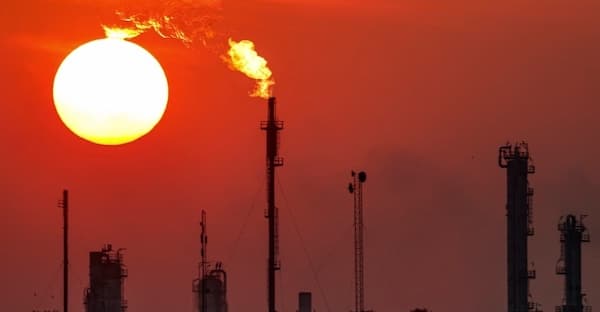In Texas, at least 134 people are dead, including 36 children, and a hundred are missing after a devastating flash flood swept through the central part of the state on July 4. A late June/early July heatwave in Europe claimed 2,300 lives across the continent. These events, of the kind made more extreme and frequent by climate change (ABC, 7/7/25; New York Times, 7/9/25), occur as EU leaders roll back climate policy and the Trump administration guts climate protections, staying true to the slogan of “Drill, baby, drill!”
Despite this dire backsliding on climate policy, with consequences that are clear as day, it’s business as usual in the realm of business news. Recent pieces in the widely read business publications Bloomberg, the Wall Street Journal and the business section of Reuters misleadingly suggested the fossil fuel industry’s profits and losses happen in a vacuum.
A clear consensus
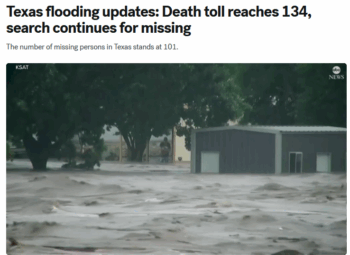
ABC (7/15/25) reports on the death toll of Texas’ fossil fuel—fueled floods.
Global leaders ignoring the climate crisis clearly aren’t making its tragic effects go away. The scientific consensus has been unmistakable for years: Fossil fuels are the main driver of climate change. In order to avoid surpassing the Paris Agreement’s 1.5°C limit, beyond which the most devastating impacts from global heating will be felt, we need to phase out fossil fuels—and fast (Union of Concerned Scientists, 1/21/21).
Many journalists have expressed this urgency while covering extreme weather and other impacts, making the connection to human-caused climate change and fossil fuel emissions (FAIR.org, 5/17/24). While these in-depth stories serve as clear explainers in outlets’ science and environment sections, the connection is still being ignored when business is discussed.
If not for the grotesque profits of fossil fuel companies—which knew about their industry’s environmental impact since the 1970s—resistance to a clean energy transition would not exist.
Industry coverage
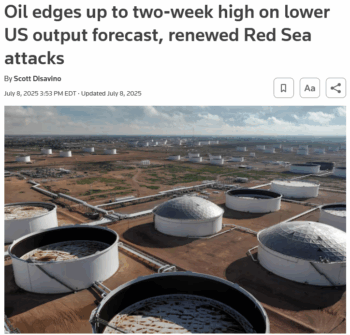
Reuters (7/8/25) reported that “the U.S. will produce less oil in 2025 than previously expected as declining oil prices have prompted producers to slow activity this year”—with no acknowledgment of the climate impact of this slowdown.
In early July, Exxon and Shell announced lower second-quarter profits from weaker oil and gas trading. Coverage in Bloomberg (7/7/25), the Wall Street Journal (7/7/25) and Reuters (7/7/25) discussed these announcements as indicative of how the rest of the fossil fuel industry will fare in Q2. Stories attributed these dips to Trump’s tariffs, Middle East tensions, excess supply and uncertain demand. Oil prices creeping up over the past two weeks were due to Houthi attacks in the Red Sea, projected lower U.S. oil production and Trump tariffs, Reuters (7/8/25) reported.
Meanwhile, reports on renewable energy stocks dipping after the passing of Trump’s so-called “Big Beautiful Bill” also failed to mention the consequences of this backslide (Reuters, 7/7/25; Bloomberg, 7/8/25): If we keep our carbon emissions at current rates, we are poised to hit the 1.5°C threshold before 2030, leading to more deadly extreme weather events worldwide (Health Policy Watch, 5/6/24).
Discussing Chevron’s efforts to cut costs, Bloomberg (7/9/25) mentioned low oil prices and an “uncertain outlook for fossil fuels.” A passing mention of an “uncertain outlook” was the closest any of these pieces gets to hinting at the relevant need to phase out fossil fuels and invest in renewables, regardless of geopolitical events and market trends.
Increased demand
The Wall Street Journal (7/10/25) reported “Oil Age Is Far From Over, OPEC Says,” citing increased energy needs globally as a reason fossil fuels will continue to be extracted. Oil correspondent Giulia Petroni wrote:
Meanwhile, OPEC also said energy policies across major economies are shifting as countries grapple with a growing array of challenges. While ambitious policy goals remain in place, a rising tide of pushback and scrutiny over climate-transition plans is emerging, particularly in the U.S. and other advanced economies, according to the cartel.
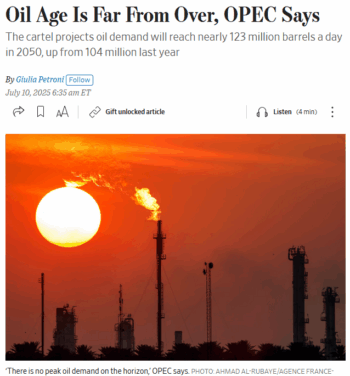
The Wall Street Journal (7/10/25) euphemized Trump’s wholesale attack on renewable energy as “a rising tide of pushback and scrutiny over climate-transition plans.”
Petroni did not cite any scientists or climate activists to push back against OPEC’s claims, let alone any of the litany of studies, data and reports that warn that if we want life on earth as we know it to continue, we simply cannot keep drilling for more oil. The International Institute for Sustainable Development (9/25/24) explained:
Peer-reviewed science shows there is no room for new coal, oil and gas development under the 1.5°C global warming limit agreed in Paris. In 1.5°C-aligned scenarios, coal production declines by 95% by 2050, and oil and gas production by at least 65%.
Another Journal piece (7/9/25) discussed a decrease in diesel supply, which could increase transport and heating costs next winter. “Lack of refining capacity growth is also a problem in the U.S., where the green energy movement has turned some refiners away from making diesel, said Flynn of the Price Futures Group,” Anthony Harrup reported—as if it’s a “problem” that green activists have succeeded in steering producers away from a climate-wrecking fuel. (No experts on renewable alternatives were cited.)
The argument that renewable energy sources can’t power the world is also not supported. According to the UN, renewables have the potential to meet 65% of the world’s energy demands by 2030 and 90% by 2050. And contrary to fossil fuel propaganda parroted by corporate media, renewable energy sources are already the cheapest power option in the majority of the world.
The AI boom
Reports about AI’s profligate energy usage from Reuters and Bloomberg also largely left out discussions about its climate impact. Reuters (7/9/25) did a story on the crisis facing the largest power grid in the country due to AI demand, as chatbots “consume power faster than new plants can be built.” The piece reported Trump ordering two oil and natural gas power plants in Pennsylvania to continue operating through the summer, despite their scheduled retirement in May, without mentioning the effect on climate.
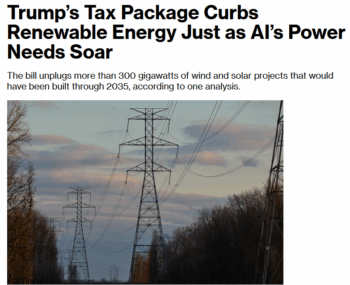
Bloomberg‘s report (7/4/25) worried that ending tax credits for renewable energy would fail to “quench the thirst of data centers that power artificial intelligence”—not that it would accelerate the climate catastrophe.
Bloomberg (7/4/25) reported on Trump’s tax package curbing renewables even as AI’s need for power increases. The piece discussed the economic implications of the policy, but left out the dire environmental consequences.
Another Bloomberg piece (7/7/25) about AI’s utility needs did briefly make the climate connection. Reporter Josh Saul alluded at the end of the article to the arguments of “critics,” who warn these data centers can “hurt climate efforts by extending the lives of carbon-emitting coal and gas plants.” But he did not quote or cite specific groups, scientists or activists.
Ironic omissions
More puzzling reporting discussed European countries needing to fill energy gaps with fossil fuels during June and July’s deadly heatwaves.
“Fossil Fuels Set to Fill Europe’s Power Gap as Wind Plunges” (Bloomberg, 7/7/25) quoted an energy strategist from Rabobank:
The longer the wind lull continues amid the scorching heat, the longer fossil fuels will have to fill the evening demand gap in power markets.

“Europe’s fleet of coal and gas plants could come to the rescue,” Bloomberg (7/7/25) reported. “The likely comeback for the region’s legacy fossil-fuel plants shows just how important they are.”
“Europe is steadily refilling storage sites that ended last winter severely depleted after a colder-than-usual heating season triggered hefty withdrawals,” another Bloomberg piece (7/7/25) stated.
Still, the region remains vulnerable to sudden shifts in supply or demand—especially as hot weather drives up energy use for cooling.
“Risks remain as most of July is expected to be hotter than usual across Europe, possibly boosting gas consumption to meet demand for cooling,” said another (Bloomberg, 7/10/25).
This “hotter than usual” weather in Europe has claimed thousands of lives, with research suggesting 1,500 of the 2,300 estimated heat deaths could be connected to climate change, which, as we know, is caused by the burning of fossil fuels (New York Times, 7/9/25). But this clear connection and ironic chicken-and-egg scenario is not explained in any of these articles.
The Wall Street Journal (7/5/25) covered Trump’s rollback of President Joe Biden’s climate law, which offered subsidies for wind and solar power, electric vehicles and other green projects, in a piece headlined “The Moment the Clean-Energy Boom Ran Into ‘Drill, Baby, Drill.’”
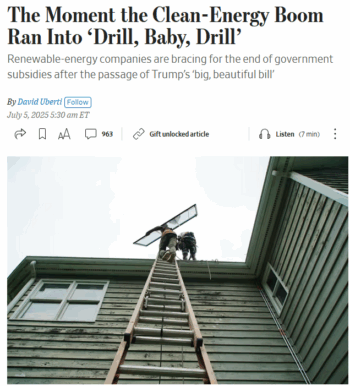
The Wall Street Journal (7/5/25) refers to the rolling back of “Biden’s climate law”—but never explains what energy and climate have to do with each other.
The piece quoted Tracy Stone-Manning, president of the Wilderness Society and director of the Bureau of Land Management under Biden; Reagan Farr, chief executive of solar developer Silicon Ranch; and Cierra Pearl, a young Maine resident who recently lost her job building solar arrays. These sources decried Trump’s sabotage of the green energy transition, but none of them were cited discussing broader climate impacts.
“The clashing visions have left many developers and workers around the country in a lurch,” Journal oil reporter David Uberti wrote. Uberti made sure to quote a statement by Tom Pyle, president of the pro-fossil fuel American Energy Alliance: “If repealing these subsidies will ‘kill’ their industry, then maybe it shouldn’t exist in the first place.” (The $20 billion the fossil fuel industry receives annually in direct U.S. government subsidies was not discussed.)
The impacts Trump’s anti—green energy policies will have on fossil fuel workers are certainly relevant, and it makes sense that business news articles would center broadly defined economic implications. But it is a glaring omission to discuss EVs, renewable energy and the possibility of oil drilling on public lands without any mention of environmental impacts and our all-but-guaranteed surpassing of the Paris Agreement threshold if we continue along this path.
Siloing the connection
These outlets have no shortage of resources to report on climate change—and the culpability of the fossil fuel industry for its ramifications. Some are already doing it in other sections of the paper.
“We need to start acting against climate change and this means, first, trying to reduce the heat in cities,” a Bloomberg piece (7/10/15) about Europe’s heatwave said, quoting environmental epidemiologist Pierre Masselot. “But at the end of the day, all these measures won’t probably be as efficient as just reducing climate change altogether, and so reducing our greenhouse gas emissions.” This article appeared in the site’s “Green” section.
In another piece (7/7/25) regarding AI’s energy demands in the “Green” section, the outlet also makes the connection to climate change. Bloomberg quoted a statement from environmental law organization Earthjustice:
Coal, gas and oil fired power plants spew millions of pounds of health-harming and climate-warming pollution into the air each year, and cost consumers millions of dollars more than cleaner energy sources.
While thorough climate reporting and mentions of the fossil fuel industry’s responsibility for global heating are difficult to find in the Rupert Murdoch-owned Wall Street Journal, its “Sustainable Business” section (6/30/25) recently covered how companies are reporting fewer details about how climate change and extreme weather are impacting their business.
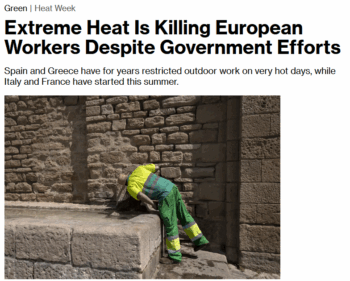
Bloomberg (7/10/15) puts a story about how climate change is killing Europeans in its special “Green” section.
In its “Sustainability” section, Reuters (7/1/25) discussed the EU heatwave’s links to climate change and fossil fuel emissions. “Scientists say greenhouse gas emissions from burning fossil fuels are a cause of climate change, with deforestation and industrial practices being other contributing factors,” Clotaire Achi, Emma Pinedo and Alvise Armellini wrote.
Last year was the planet’s hottest on record.
The ‘silent majority’
Recent studies have revealed that between 80—89% of people worldwide are concerned about climate change and want their governments to do more to address it. But this vast majority of global citizens is ignored by reporting that treats the relentless extraction of fossil fuels as a source of profit rather than an existential threat. The climate journalism resource group Covering Climate Now, of which FAIR is a partner, refers to these people as the “silent majority.” Public support is widespread, but public discourse is lagging behind.
Major publications should not relegate the causes of climate change to their science and environmental sections. They need to be front and center in pieces that focus on the industry responsible for driving it, profiting from it and lying to the public about it for decades.
This story is part of the 89 Percent Project, an initiative of the global journalism collaboration Covering Climate Now.
Olivia Riggio became FAIR’s administrative and fundraising director in March 2021. She holds a bachelor’s degree in journalism from Ithaca College and is a former FAIR intern. She is published in outlets including The Indypendent, The Progressive and KCET, along with serving as a guest host for The Indypendent‘s news hour on WBAI 99.5FM in New York. She currently also serves on the board of the Accountability Journalism Institute.

